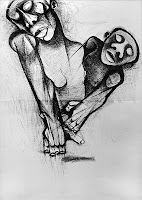Home and Away: History should not be lost
 |
| Dumile Feni (1942-1991), For the Child |
I took my nine year old daughter to the opening night, coincidentally National Sorry Day (in Australia)and Africa Day, May 26.
While I told her to prepare for some disturbing images I wanted her to see them for herself. Art, however disturbing, has the power to unlock the human spirit and help people rise above oppression.
My kids are aghast at stories about what life was like during Apartheid. They almost don't believe it could have happened. But it did, and as the former Prime Minister, Malcolm Fraser, said in his formal remarks to open the show, history is very repetitive and so we must not forget.
Our capacity for inhumanity seems to be endless, Fraser decried. Just look at Syria and the torture of children in that country to suppress the pro-democracy movement. The recent arrest of Serbian war crimes suspect Ratko Mladic has reminded us of the senseless massacre of thousands of Muslims.
Voices of dissent were expressed when the works in 'Home and Away: A Return to the South' were produced. At the time the images were made there were no markets or venues where this art could be seen and this resulted in much of the work leaving South Africa. The Ifa Lethu ("Our Heritage") Foundation's mission has been to repatriate the works and build a collection of apartheid era South African art. A second collection, Art Against Apartheid, founded in France in 1980 was a rallying point for international artists to create works in solidarity with South Africans.
The two collections are united in their focus on human rights. South African artists represented include Dumile Feni, Ezrom Legae and Lucky Sibiya, and previously marginalised artists including Victor Gordon who now lives in Orange in regional NSW.
At the opening, I had the privilege of speaking to Malcolm Fraser, now aged 81, about the significance of the show and his long-held passion for positive change in South Africa.



Comments